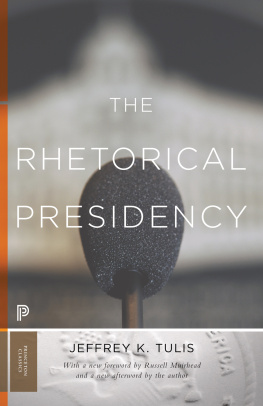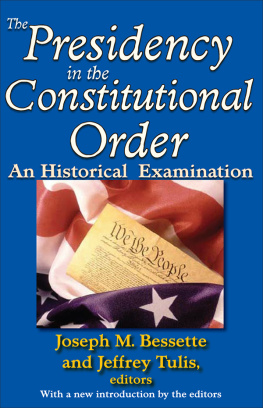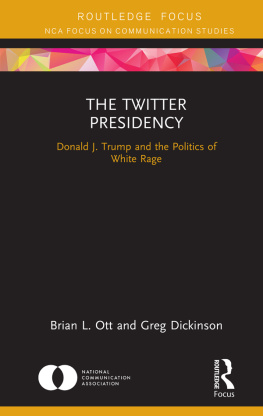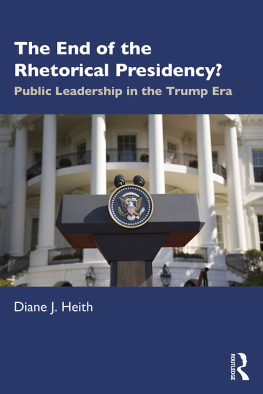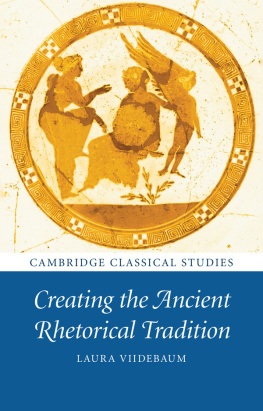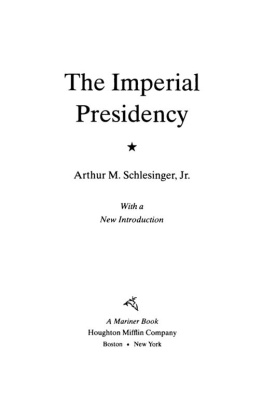The Rhetorical Presidency
The
Rhetorical
Presidency
Jeffrey K. Tulis
With a new foreword by Russell Muirhead and a new afterword by the author
Princeton University Press
Princeton and Oxford
Copyright 1987 by Princeton University Press
Foreword and afterword to the Princeton Classics Edition,
copyright 2017 by Princeton University Press
Published by Princeton University Press,
41 William Street, Princeton, New Jersey 08540
In the United Kingdom: Princeton University Press,
6 Oxford Street, Woodstock, Oxfordshire OX20 1TR
press.princeton.edu
All Rights Reserved
Cover design by Michael Boland for thebolanddesignco.com
First Princeton Classics edition, with a new foreword
by Russell Muirhead and a new afterword by Jeffrey K. Tulis, 2017
Cloth ISBN 978-0-691-02295-6
Paper ISBN 978-0-691-17817-2
The Library of Congress has cataloged the prior edition of this book as follows:
Tulis, Jeffrey.
The rhetorical presidency.
Includes bibliographical references and index.
1. PresidentsUnited StatesHistory. 2. Political
oratoryUnited StatesHistory. I. Title.
JK518.T841987353.032387-45542
British Library Cataloging-in-Publication Data is available
This book has been composed in Times Roman
Printed on acid-free paper.
Printed in the United States of America
1 3 5 7 9 10 8 6 4 2
TO MY MOTHER
AND THE MEMORY OF MY FATHER
CONTENTS
ACKNOWLEDGMENTS
My attempt to speak, all at once, to readers with diverse interests in American politicspolitical development, political behavior, or political thoughtwas nurtured by a number of outstanding scholars of the presidency whose own work sets a high standard for research in one or more of these fields. Benjamin I. Page saw the merit of trying to address diverse audiences and provided guidance on how to do so. Elmer Cornwell planted the seed of this study in my head several years before I discovered the topic. Fred I. Greenstein unstintingly provided helpful criticism and allowed me to draw upon the vast bibliography on American politics that he carries in his head. Whatever merit this book displays as a theoretical work derives from the wisdom of my teacher, Herbert J. Storing.
A number of colleagues at Princeton took time from their own work to read mine. My thanks to Walter F. Murphy, Ezra Suleiman, Jameson Doig, and Robert C. Tucker for their suggestions on early drafts of various chapters. I am grateful to Anne Norton and Sheldon Wolin for illuminating discussions of several of the issues I treat.
Numerous colleagues at other institutions offered critiques of the text, forums to try out some ideas, or the opportunity to read their own related work in progress. I would like to thank Larry Arnhart, Peri Arnold, John Burke, Joseph Cropsey, Juan De Pascuale, Robert Eden, Ester Fuchs, J. David Greenstone, Samuel Kernell, Carnes Lord, and Uday Mehta for their various kindnesses, and I would especially like to thank the referees for Princeton University Press, Theodore Lowi and Michael Nelson, for their thoughtful reports.
I indicate a number of specific debts in the footnotes, but I shall also mention here a number of individuals whose own work has considerably influenced mine: Sotirios A. Barber, Joseph M. Bessette, James W. Ceaser, William F. Harris II, Harvey C. Mansfield, Jr., Gary J. Schmitt, and Glen E. Thurow.
The opportunity to work with very capable graduate students at Notre Dame and Princeton has been a special pleasure. I would like to thank particularly all those who served as teaching assistants in my course on the presidency. The diligence and insight of my research assistant, Ines Molinaro, greatly enhanced the book.
The American Council of Learned Societies and, through it, the National Endowment for the Humanities provided a fellowship that enabled me to write free from regular teaching responsibilities. Michael Francis, on behalf of the Department of Government at Notre Dame, provided support for research assistance on appeared as The Two Constitutional Presidencies, in The Presidency and the Political System, ed. Michael Nelson (Washington, D.C.: CQ Press, 1983). Permission from Congressional Quarterly, Inc. to incorporate this material is gratefully acknowledged.
My wife, Jean Ehrenberg, lent her talents as historian to , and as psychologist to the whole endeavor. My familys patience and care were indispensable to the books completion.
FOREWORD
Political science aims to predict, yet politics remains full of surprisesnot always happy ones, and too often harbingers of darker times to come. To avoid such dangers, we need to control our collective fate, to understand where we are, where we are likely headed, and how we might steer away from calamity and toward destinations we desire. That is the point of politicsand political science. In the absence of predictive powerand because people are free, predictive power will always be elusivewhat we need is diagnostic power, or an account of politics that empowers us to diagnose the health of our politics, to assess what parts are in good or bad repair, to see what might be treated and even cured.
No book offers a more profound diagnosis of the American presidency today than Jeffrey Tuliss The Rhetorical Presidency. Indeed, since the book situates the presidency in relation to the larger constitutional order, it offers a way of understanding the regime itself.
The heart of Tuliss achievement is his excavation of the constitutional understanding in which presidential action is embedded. Presidents before Woodrow Wilson saw themselves as bearers of a constitutional office that imposed constraints on what they could say and do. Prior to the twentieth century, presidents were formaldistant, restrained, dignifiedbecause they thought the Constitution required formality. Constitutional forms, like the office of the presidency itself, made politics a formal activity where propriety mattered more than passion or authenticity.
Formality is uncomfortable. Dressed in heels or wearing a tie, careful to keep on our best behavior, we cannot quite be ourselves or be natural; conversation is stilted or even halting as we strive to sound more thoughtful, more considerate, and more attractive than we ordinarily are. In the same way, the formality of constitutional politics inhibited presidents: they could not speak and act in any old way they pleased. Instead, they often expressed themselves in writing, which unlike every stray utterance is designed to withstand scrutiny. The formality of the nineteenth-century pre-rhetorical presidency made it possible to distinguish between a popular representative (which the Constitution prescribed) and a popular leader (which the Constitution proscribed). The Constitution stood between the people and their representatives by liberating representatives from the daily demand of pleasing their constituents, affording representatives the space to reflect, discuss, and judge.
But democracies, as Tocqueville observed (with Andrew Jacksons example fresh in mind) do not like formality. Formality prompts us to make ourselves presentable by revealing what is best and hiding the rest, and this implies inequality, as if some of what people think and feel and want is less respectableand less worthythan the rest. A culture of democratic equality makes it natural to resent inhibitions imposed from the outside by social expectations (which themselves reflect an advantaged, elite social class). Bettermore comfortable, more satisfying, and more democraticto dress in jeans or something comfortable, to say plainly what we think in the easygoing manner of everyday talk.

